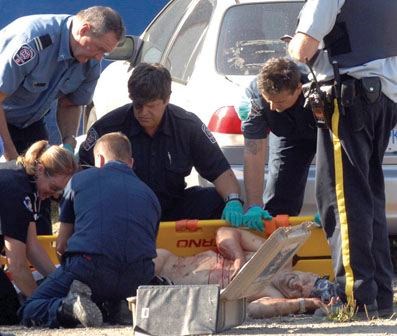A man who shot an adversary and left him lying in a driveway bleeding and writhing in pain was described during a sentencing hearing Thursday as a devoted father and successful business manager who succumbed to the "curse of addiction."
Bradley Douglas Barr, 36, was found guilty in July of discharging a firearm with an attempt to wound or disfigure for the September 2012 incident that left Craig Frederick Lyver, 43, with shotgun wounds to a leg, hip and arm.
While Crown counsel argued for a sentence of eight to 10 years, Barr's lawyer, Richard Fowler, contended five to six years is more appropriate and spent much of his presentation providing a synopsis of his client's life.
He said Barr was born and raised in Fort St. John and grew up in a loving and devoutly religious family. His father was involved in the Boy Scouts and Barr went so far as to earn the Chief Scout Award, the highest award that can be earned in the movement.
In 1993, after completing Grade 8, Barr landed a job pumping gas and saved up enough money to travel to Hawaii with a friend.
"Unfortunately, it was on that trip that he started experimenting with drugs and alcohol, which have been a problem for many years for Mr. Barr," Fowler said.
Barr was nonetheless able to get married, become a father and pursue some business ventures. At one point, he became the manager of a tire store in Hope that had not made money in a decade and turned a profit during his first year on the job.
But his marriage broke down and he did not take it well.
"He began drinking heavily," Fowler said.
"Over the next six months, he lost his job, ruined his credit and his family fell apart."
Barr entered rehabilitation at a treatment centre in Duncan on Vancouver Island. His ex-wife and their children followed him to the community but they then moved to Vanderhoof where she could be closer to her mother.
Looking for a way to be closer to his children, Barr contacted Booster Juice and learned they wanted to expand into Prince George. With his parents' help, Barr got a franchise and in December 2009, he and his new girlfriend moved to this city.
But Barr got caught up in the local drug scene and the business went from profitable to the point where his parents had to let him go as the manager of the outlet. They also tried repeatedly to get him to move out of Prince George.
Barr has had a "lot of things go right for him in his life," his mother said in a letter to the court. "However, he's also had the curse of addiction."
Barr was arrested in September 2012 following the shooting.
He had faced a count of attempted murder but following a nine-day trial in Prince George, Barr was found guilty of the lesser count of discharging a firearm with an attempt to wound or disfigure.
Barr had been at odds with Lyver over the operation of a marijuana grow operation.
But it appears Lyver had been bracing himself for a confrontation with Jason Alexander Hall, the ex-Renegades motorcycle gang president who was murdered in a drive-by shooting in March when Barr had shown up to collect his personal items from a 2800-block Northwood Pulp Mill Road property where they had been growing the marijuana.
Whether Lyver was actually armed was not clear from the evidence but the court found Barr shot him.
According to testimony, Barr then walked up to Lyver and asked him why he should not just kill him right then and there.
"Because we're bros and I love you," Lyver replied and Barr walked away.
Clearly, Barr could have shot Lyver at that point, B.C. Supreme Court Justice Ron Tindale said when he issued a verdict on Barr's guilt in July and was left with reasonable doubt that Barr had left Lyver there to die.
In a victim impact statement, Lyver said he continues to suffer from intense pain, is sometimes barely able to walk and had limited function in his right arm and hand.
Lyver said he also seeing a psychiatrist to deal with nightmares from the incident , is no longer able to work and enjoy such activities as hiking, biking and running.
B.C. Supreme Court Justice Ron Tindale will issue a decision on sentencing later this month.



